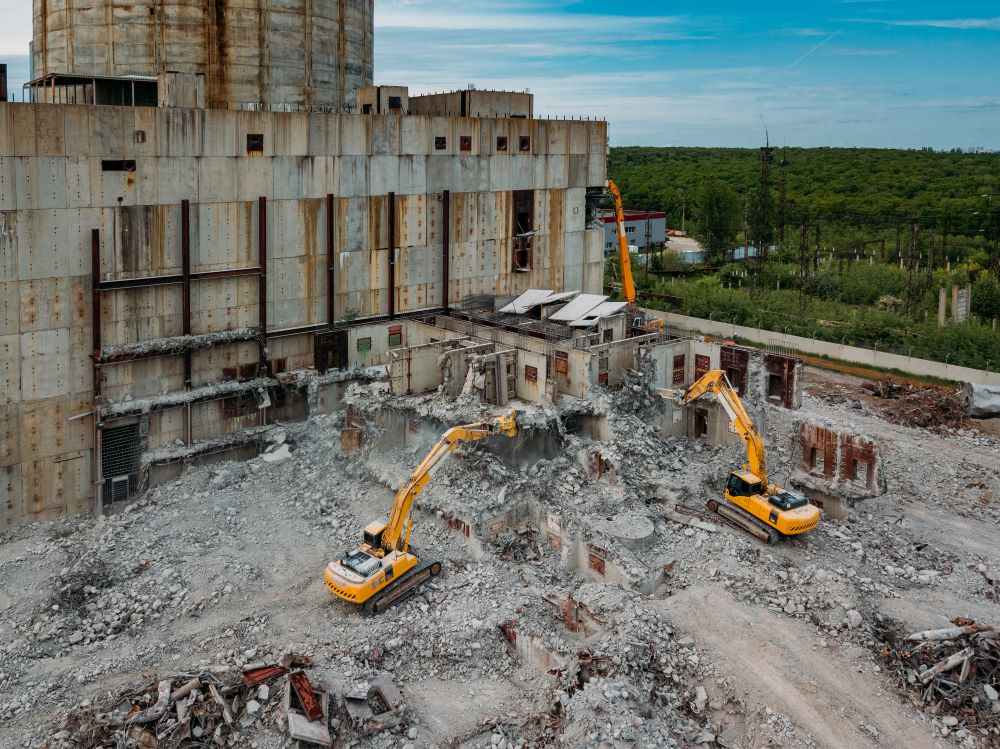
Risk Management by Industrial Demolition Contractors
Industrial demolition is a difficult and dangerous project that has to be carefully planned and carried out to protect the environment and personnel. It is impossible to overestimate the significance of risk management in industrial demolition since there are a lot of moving parts, large buildings, and complex procedures involved.
Industrial demolition contractors can reduce the possibility of mishaps, injuries, and environmental harm while also guaranteeing the timely and cost-effective completion of projects by placing a high priority on risk management.
OUR SERVICES
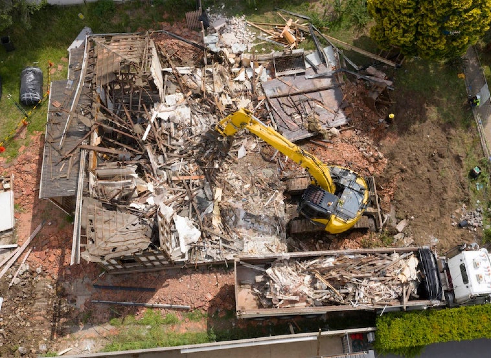
Structure Demolition. Residential, Commercial & Industrial
If your structure poses a health, safety, or environmental risk, demolition can prevent costly citations or fatal accidents. While this may seem daunting, you are just a phone call away from having your residential demolition done professionally, responsibly, and at a great price.
Talk to a Demolition Specialist Now! 916.249.5001
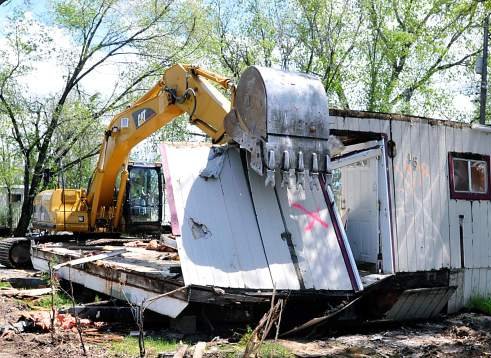
Mobile Home Demolition
We demolish and haul away mobile homes. Any size, anywhere, anyhow. We are fast, clean and competitive. We serve most of Northern California. There are many factors to consider when removing or demolishing your old trailer, mobile home, or manufactured home like: the processes involved, costs, time, contractors, debris, and permits.
Talk to a Demolition Specialist Now! 916.249.5001
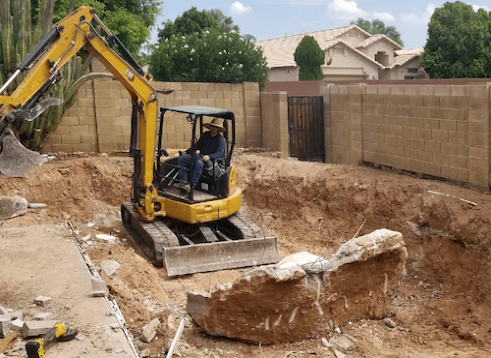
Pool Demolition
When removing a pool in Sacramento, California with the professional demolition team of Maxton Demo, you’re guaranteed peace of mind from beginning to end. From your initial request for an estimate to clean-up, you can expect our pool demolition process that’s completely professional and safe.
Talk to a Demolition Specialist Now! 916.249.5001
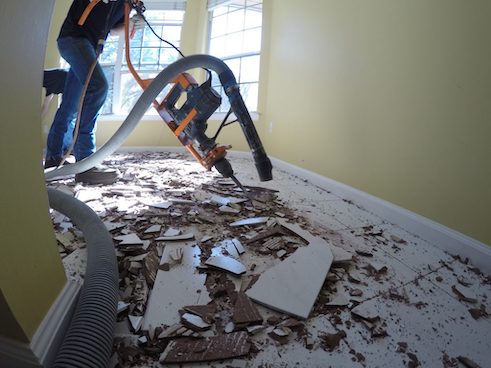
Floor Demolition
Flooring demolition, like any other major home renovation work, requires a specific set of skills and tools to be performed properly. You need experts in flooring demolition to get you the best floors possible. Contact us to find out more about how we can help you today.
Talk to a Demolition Specialist Now! 916.249.5001
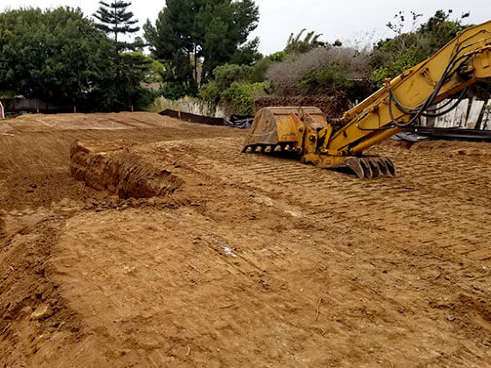
Grading & Excavating
If you need an experienced excavator and grader in Sacramento, call us today. One of the many reasons that residential, commercial, and industrial customers choose to work with us is because we’re able to provide a broad range of services to help construction-related projects get done in less time and at a reduced cost.
Talk to a Demolition Specialist Now! 916.249.5001

Roof Snow Removal
Heavy snow & ice dams can cause significant roof and home damage. Roof Snow removal is our specialty during the winter months. Serving the Sacramento, California area for 10 years, we can get your roof snow removed and promise a quick response and reasonable rates.
Talk to a Demolition Specialist Now! 916.249.5001
Developing a Plan for Industrial Demolition Risk Assessment
Throughout the course of the project, contractors may anticipate, avoid, and reduce any hazards by creating a risk assessment strategy for industrial demolition. Identifying hazards, assessing risks, putting controls in place, and keeping an eye on their efficacy are all common steps in the risk assessment process.
Through the involvement of many stakeholders, such as project managers, engineers, safety officers, and regulatory authorities, contractors may create a thorough risk assessment strategy that covers all potential hazards and guarantees the safety of all parties.
It is impossible to overstate the importance of qualified and certified experts in risk management, as they have the knowledge and experience necessary to recognize, evaluate, and successfully control risks. With the particular knowledge and abilities that certified safety professionals, engineers, and demolition specialists bring to the table, contractors may use best practices and safety regulations that reduce risks and maximize project results. By investing in staff certification and training, contractors distinguish themselves as leaders in the safety and compliance of the industry and show a dedication to excellence in risk management.
A key component of efficient risk management in industrial demolition is the use of safety procedures and best practices. Contractors need to put safety first at every step of the demolition process, from setting up clear lines of communication and emergency response plans to supplying personal protective equipment and carrying out routine safety assessments.
Contractors may develop a work environment that encourages hazard awareness, risk reduction, and incident prevention by encouraging a culture of safety consciousness and responsibility among employees.
Instruments and Technology for Industrial Demolition Risk Reduction
Contractors now approach safety and efficiency in demolition projects with a whole different mindset, thanks to the development of equipment and technology for risk reduction in industrial demolition. A few examples of cutting-edge technology that allow contractors to precisely and accurately collect data in real-time, evaluate structural integrity, and monitor environmental conditions include drones, sensors, 3D modeling software, and robots.
Contractors may improve project planning and execution for better results, expedite decision-making procedures, and strengthen their risk management skills by using these technologies.
In industrial demolition, there may be substantial costs associated with neglecting risk management, including loss of life, property damage, legal ramifications, and damage to one’s image. Inadequate risk management may lead to accidents, injuries, and environmental catastrophes that can have far-reaching effects on the contracting firm’s long-term profitability and success, in addition to the project at hand.
Contractors that fail to manage risk subject themselves to needless hazards that threaten their reputation, profitability, and capacity to compete in a cutthroat market.
The Prospects of Risk Management in the Sector of Industrial Demolition
In the industrial demolition sector, proactive, tech-driven risk management that puts safety, compliance, and innovation first is the way of the future. Through the adoption of optimal methodologies, the allocation of resources towards education and accreditation, the use of instruments and technology, and the assimilation of efficacious case studies, industrial demolition contractors may augment their risk mitigation proficiencies and set themselves apart from competitors.
To maintain sustainable development, profitability, and safety for all stakeholders, contractors must continue to be alert, flexible, and forward-thinking in their approach to risk management as the industry changes and new issues arise.
The Value of Managing Dangerous Substances in Demolition Projects
In demolition operations, materials, buildings, and structures are removed; these items often include dangerous elements, including mildew, asbestos, and lead. If not handled appropriately, these materials pose major health dangers to both the surrounding environment and personnel.
In order to safeguard all project participants, demolition contractors are essential in making sure that hazardous items are recognized, handled, and disposed of properly. Contractors protect the environment and the health and safety of their employees by emphasizing the appropriate handling of hazardous materials.
Demolition contractors must possess a thorough awareness of the many kinds of dangerous materials that are often seen on construction sites. For instance, asbestos, a known carcinogen, was widely utilized in construction until its health risks were identified. Another dangerous substance is lead, which may seriously harm a person’s health, particularly in young children and expectant mothers.
While mold isn’t necessarily as harmful as asbestos or lead, it may still cause allergies and respiratory issues. Contractors who are knowledgeable about these dangerous substances are better able to put plans in place to minimize the dangers involved with demolition.
Improper management of hazardous chemicals during demolition operations may result in financial liability and legal ramifications in addition to health dangers. To safeguard the environment and public health, the handling, removal, and disposal of hazardous materials are governed by municipal, state, and federal regulations.
In order to avoid fines and penalties, demolition contractors must abide by certain requirements. Following the rules guarantees that hazardous items are handled properly, reducing their negative effects on the environment and safeguarding future generations.
Recognizing the Various Hazardous Material Types at Demolition Sites
Hazardous materials may be found in a variety of places and forms at demolition sites, so contractors must handle them carefully and with specific knowledge to ensure safety. Asbestos is a fire-resistant mineral fiber that is widely utilized in flooring, roofing, and insulating products. Asbestos fibers may become airborne during demolition and provide a serious danger if breathed in.
Lead poisoning may be prevented by taking cautious precautions with lead, which is often present in paint, pipes, and solder. One kind of fungus that grows well in moist conditions is mold, which may contaminate building materials and lead to health problems for building occupants.
In order to properly handle hazardous materials at demolition sites, contractors need to carry out comprehensive evaluations to pinpoint the location and amount of these items. Procedures for testing and sampling aid in figuring out how concentrated hazardous compounds are, which directs the creation of risk-reduction plans.
Contractors may limit exposure and environmental effects by customizing their removal and disposal procedures based on their identification of the exact kinds of hazardous chemicals present. This proactive strategy guarantees regulatory compliance while safeguarding the community and employees.
To properly handle hazardous chemicals, demolition contractors often work with regulatory bodies and environmental specialists. Through these collaborations, contractors may have access to resources and specialist knowledge for handling complicated hazardous chemicals.
Through the use of subject-matter specialists’ expertise, contractors may improve their demolition procedures, lower risks, and exhibit their dedication to environmental stewardship. Contractors may improve their skills and reputation in the industry by staying up-to-date on the latest trends and best practices in hazardous material management through continuous education and training.
Rules and Procedures for Managing Hazardous Substances During Demolition
A thorough system of rules and regulations covering the management of hazardous chemicals in demolition operations is in place to safeguard the environment, the public, and the workforce. To guarantee compliance and safety, regulatory organizations at the local, state, and federal levels set rules for the identification, removal, transportation, and disposal of hazardous materials.
To protect everyone’s safety and prevent legal issues, demolition contractors need to be aware of these rules and follow them closely throughout the process.
The Occupational Safety and Health Administration’s (OSHA) Hazard Communication Standard is one of the main laws governing the handling of hazardous chemicals in demolition. Employers are required by this guideline to provide workers with information about hazardous substances via labels, safety data sheets, and training initiatives.
Contractors lower the risk of exposure and accidents on the construction site by arming personnel with the knowledge and training they need to identify and handle hazardous chemicals properly.
The Environmental Protection Agency (EPA) establishes standards for the appropriate treatment and disposal of hazardous material created during demolition operations in addition to OSHA rules. A cradle-to-grave framework for handling hazardous waste is established under the Resource Conservation and Recovery Act (RCRA), which places a strong emphasis on appropriate treatment, disposal, storage, and transportation.
RCRA regulations must be followed by demolition contractors in order to avoid contaminating the environment and safeguard public health from the harmful impacts of hazardous materials.
Safety Procedures for Demolition Contractors Using Hazardous Substances
When handling hazardous chemicals, demolition contractors encounter particular difficulties that require the implementation of strict safety procedures to safeguard both their employees and the surrounding environment. During demolition operations, personal protection equipment (PPE) is essential for preventing worker exposure to dangerous chemicals. PPE that forms a barrier between workers and hazardous materials must include respirators, protective clothes, gloves, and goggles.
In order to guarantee demolition contractors’ safety while handling hazardous chemicals, training and education are essential. To carry out their jobs efficiently and safely, employees need thorough training on the recognition, management, and disposal of hazardous chemicals. Employees are empowered to make educated choices and take proper action in dangerous circumstances when they are taught about the most recent safety regulations and best practices via ongoing education programs.
To provide a safe work environment during demolition operations, excellent communication and hazard awareness are essential, in addition to personal protective equipment (PPE) and training. Establishing unobstructed lines of communication among employees, managers, and safety staff promotes the sharing of vital information and guarantees that all parties are aware of any risks.
Hazard identification is the process of determining the dangers connected to hazardous chemicals and proactively mitigating those risks before they become more serious. Demolition contractors foster an atmosphere where everyone’s health and safety are given first priority at work by encouraging a culture of safety and responsibility.
Hazardous Materials: Proper Disposal and Recycling in Demolition Projects
To minimize environmental pollution and preserve public health, the disposal of hazardous materials in demolition operations involves careful planning and adherence to legal standards. Demolition contractors are required to adhere to specified procedures for the safe handling and disposal of hazardous material in order to reduce environmental damage and guarantee legal compliance. Appropriate disposal techniques not only reduce hazards but also advance sustainability by making it easier to recycle and reuse items where it is feasible.
Landfill disposal is a popular technique for getting rid of hazardous waste used in demolition operations. Materials deemed hazardous are packed, tagged, and transported in a secure manner to approved landfills that are specifically equipped to manage certain kinds of hazardous waste.
In order to avoid soil, water, and air pollution, landfill disposal guarantees that hazardous waste is confined and segregated from the environment. In order to guarantee that hazardous trash is disposed of in compliance with legal requirements, demolition contractors maintain close collaboration with certified waste management firms.
Recycling is an eco-friendly alternative to landfill disposal for handling hazardous items in demolition operations. Many building materials, including concrete, wood, and metal, may be recycled and used again for other projects, lowering the need for virgin resources and cutting down on waste.
Contractors help the circular economy and sustainable practices by separating recyclables from hazardous waste streams. In addition to protecting natural resources, recycling hazardous materials lessens the total environmental impact of demolition work.
Certain hazardous materials, such as paint containing lead and electronic trash, need to be recycled using specific techniques in order to salvage valuable components and shield the environment. While electronic trash may be disassembled to recover precious metals and electronic components, lead-based paint can be treated to remove lead for reuse in manufacturing.
In order to guarantee that hazardous items are recycled safely and in accordance with environmental requirements, demolition contractors collaborate with accredited recycling facilities. Contractors show their dedication to sustainable development and environmental management by giving recycling initiatives first priority.
Certifications and Instructions in the Handling of Hazardous Materials for Demolition Contractors
To prove that they can handle hazardous chemicals safely and in accordance with the law, demolition contractors must complete extensive training and get certificates. Numerous subjects are covered in training programs, such as identifying hazards, using personal protective equipment (PPE), containment techniques, disposing of waste, and emergency response methods. Contractors may provide their employees with the information and abilities needed to carry out demolition jobs in an efficient and responsible manner by investing in training and certifications.
For demolition contractors, the Asbestos Hazard Emergency Response Act (AHERA) certification is one of the most accepted credentials. In order to prevent asbestos exposure among the general public and workers, this certification program teaches contractors how to safely identify, remove, and dispose of items that contain asbestos.
The dedication of AHERA-certified contractors to maintaining industry norms and best practices in asbestos treatment gives regulatory bodies and customers alike confidence.
Demolition contractors may get certificates in lead abatement, mold remediation, hazardous waste management, and other specialist fields involving hazardous materials in addition to AHERA certification.
Advantages of Using Skilled Demolition Contractors to Handle Hazardous Materials
The knowledge and experience of demolition contractors are crucial for guaranteeing safe, effective, and legal procedures for managing hazardous materials in demolition operations. For project owners, hiring skilled contractors with expertise in hazardous material management has several advantages, such as lower risks, more efficient procedures, and comfort in knowing the job is in good hands.
Experienced contractors can confidently and precisely handle challenging hazardous material difficulties because they bring a plethora of expertise, skills, and resources to the table.
Risk reduction is one of the main advantages of using seasoned demolition contractors when handling hazardous materials. Demolition operations may be dangerous, and contractors with experience handling hazardous chemicals are aware of these risks.
Contractors may reduce the possibility of mishaps, hold-ups, and compliance problems by working proactively to detect, evaluate, and manage hazardous material hazards. Their proactive approach to risk management creates a climate of collaboration and success for project stakeholders by inspiring trust and confidence.
Skilled demolition contractors not only reduce danger but also handle hazardous materials with speed and economy. They are able to maximize resource usage, minimize waste, and improve processes because they are conversant with industry best practices, laws, and technology.
Contractors may accelerate project timeframes, improve productivity, and provide better outcomes within budgetary limits by optimizing hazardous material management methods. For project owners, the efficiency advantages achieved via the hire of seasoned contractors result in real benefits in the form of cost savings and project success.
Furthermore, while handling hazardous materials, competent demolition contractors put quality, safety, and environmental stewardship first. Through the implementation of strict safety protocols, quality control procedures, and sustainable practices, contractors exhibit their dedication to safeguarding workers, the general public, and the environment throughout the demolition process.
Their commitment to quality and compliance guarantees the responsible management of hazardous materials, the reduction of risks, and the achievement of project outputs that either meet or surpass expectations. When project owners use seasoned contractors, they may feel secure knowing that their money is protected and their goals are handled with honesty and competence.
Demolition contractors’ responsibility to ensure the efficient and safe handling of hazardous materials
To sum up, demolition contractors are essential to the efficient and responsible handling of hazardous materials during demolition operations. Contractors play a critical role in ensuring the community’s and employees’ health and safety, from identifying and evaluating hazardous materials to putting safety measures in place and adhering to legal requirements.
In hazardous material management, contractors show their dedication to quality and environmental stewardship by funding specific equipment, training, and certifications.
Technical know-how, regulatory awareness, and a commitment to best practices are needed for the safe handling of hazardous chemicals in demolition operations. Utilizing their expertise and experience, demolition contractors provide safe, effective, and compliant solutions that safeguard the environment and public health while navigating the difficulties of hazardous material management.
Through their emphasis on safety, risk reduction, and sustainability, contractors maintain industry norms and establish the standard for excellence in the handling of hazardous materials.
The need for demolition projects will only increase, and contractors will play an ever more important role in managing hazardous materials. By keeping up to date with new laws, regulations, and technological advancements, contractors can adjust to changing needs and provide creative solutions that put quality and safety first.
Setting an example for future demolition projects, contractors, government agencies, and project stakeholders must work together to ensure that hazardous materials are disposed of ethically and sustainably. Demolition contractors make the built environment safer, cleaner, and more resilient for future generations with their knowledge and commitment.
Do you have a Question?
Talk to a Demolition Specialist Now! 916.249.5001
Request Formal Quote